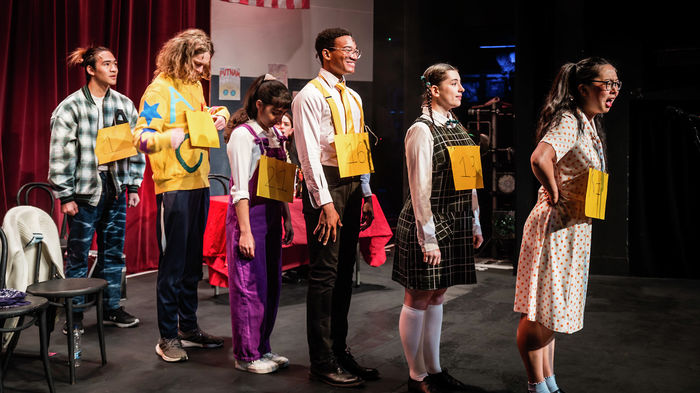In defence of the Assistant Director
Eliza Ousey explores the way into the Cambridge theatre scene that no one talks about

Last Lent, I decided to do some theatre. My creative side begged to be exercised, my fresher self was keen to make friends out of college, and – honestly, it was mainly this – I wanted a Camdram credit. There was but one issue: I cannot act. Or at least, not really. Like (I suspect) a lot of people, I tried ludicrously hard at Drama GCSE and did school plays, but that is more a testament to my teenage audacity than any great talent. I sing a bit, but can only aspire to the level of CUMTS. And my broken laptop runs on hopes, dreams and system resets, so lighting design seemed like a no-go.
Assistant directing (ADing) was the perfect solution. My existing interest in theatre reassured me that I could have a pretty good shot at it, and that all important ‘A’ removed the pressure of coordinating a whole production myself. Since then, I’ve AD’d seven times, and loved every minute.
I went into my first show (Pirates of Penzance, a rogue but wonderful choice), absolutely shit-scared. ‘Theatre people’ have this uncanny talent to seem as if they know exactly what they’re doing at all times, which is perhaps the greatest testament to their acting ability. Wrapped up in how deeply unchill I must have seemed, it took me a while to realise that, like most people at Cambridge, we were all kicking very hard under the surface.
“‘Theatre people’ have this uncanny talent to seem as if they know exactly what they’re doing at all times”
But ADing teaches you self-confidence. An inveterate people-pleaser, I quickly found myself confronted by the fact that, if I wanted to have my say, I would have to actively assert my opinions. Directors I worked with would ask me what I thought, but, understandably, in the flow of rehearsals it wasn’t top of their list of priorities. Looking back, I treated rehearsals as a kind of exposure therapy; there is no greater antidote to shyness than a room of people – of actors, no less – who expect you to tell them what to do. Once I found the assurance to interrupt my experience became 100% better, and the insecure part of me was surprised to find that, generally, people liked my ideas when I voiced them.
ADing is not generally a terrifying task, I promise, but for me, it challenged the core of my insecurity, something I didn’t know I needed. The essential directorial principle – say things confidently, and people will respond – is, I think, a pretty good rule for life, particularly under a patriarchal system which tells women to temper their ideas and be accommodating. As my supo partners can attest, I now never shut up, and don’t intend to. If any of this experience resonates, I beg you to consider ADing. It might change your life, or at least your uni experience.
“The essential directorial principle – say things confidently, and people will respond – is, I think, a pretty good rule for life”
ADing is also, quite simply, a lot of fun. I have filled in for every part under the sun in rehearsals, become an amateur costume designer and choreographer, and can now (just about) tango and polka. I met my girlfriend in a show I ADed (awwww) (on this: if you are queer, and on Hinge, you will come across everyone you’ve ever met at the ADC on there. I don’t make the rules). I also once had a really nice pasty at Peterborough train station, travelling from Edinburgh to Cambridge to retrieve a costume (admittedly less of a convincing reason, but, like all of Fringe, funny in retrospect. And the pasty was excellent).
Seriously though, as someone who loves theatre but craves a bit more balance than the real ADC hacks have (when do they sleep?), assistant directing is amazing. You don’t need much existing knowledge, just opinions and a willingness to work with people. The shows I’ve done more recently – Iolanthe, Nigel Slater’s Toast – have brought me immeasurable joy. Get on Camdram and apply.
The next step for me, I suppose, is to ditch the ‘A’ and direct for real. I want to see what it’s like to take the lead, and be fully in charge of rehearsing a show. As much as I’m passionate about assistant directing (you should do it; everyone should do it), I owe it to myself to put that practice to good use. I guess that means a spot will be opening up for some more assistant directors.
 News / Clare Hall spent over £500k opposing busway 24 December 2025
News / Clare Hall spent over £500k opposing busway 24 December 2025 Comment / The ‘class’ of Cambridge24 December 2025
Comment / The ‘class’ of Cambridge24 December 2025 News / Caius mourns its tree-mendous loss23 December 2025
News / Caius mourns its tree-mendous loss23 December 2025 Comment / League tables do more harm than good26 December 2025
Comment / League tables do more harm than good26 December 2025 News / Girton JCR publishes open letter expressing solidarity with Palestine25 December 2025
News / Girton JCR publishes open letter expressing solidarity with Palestine25 December 2025









